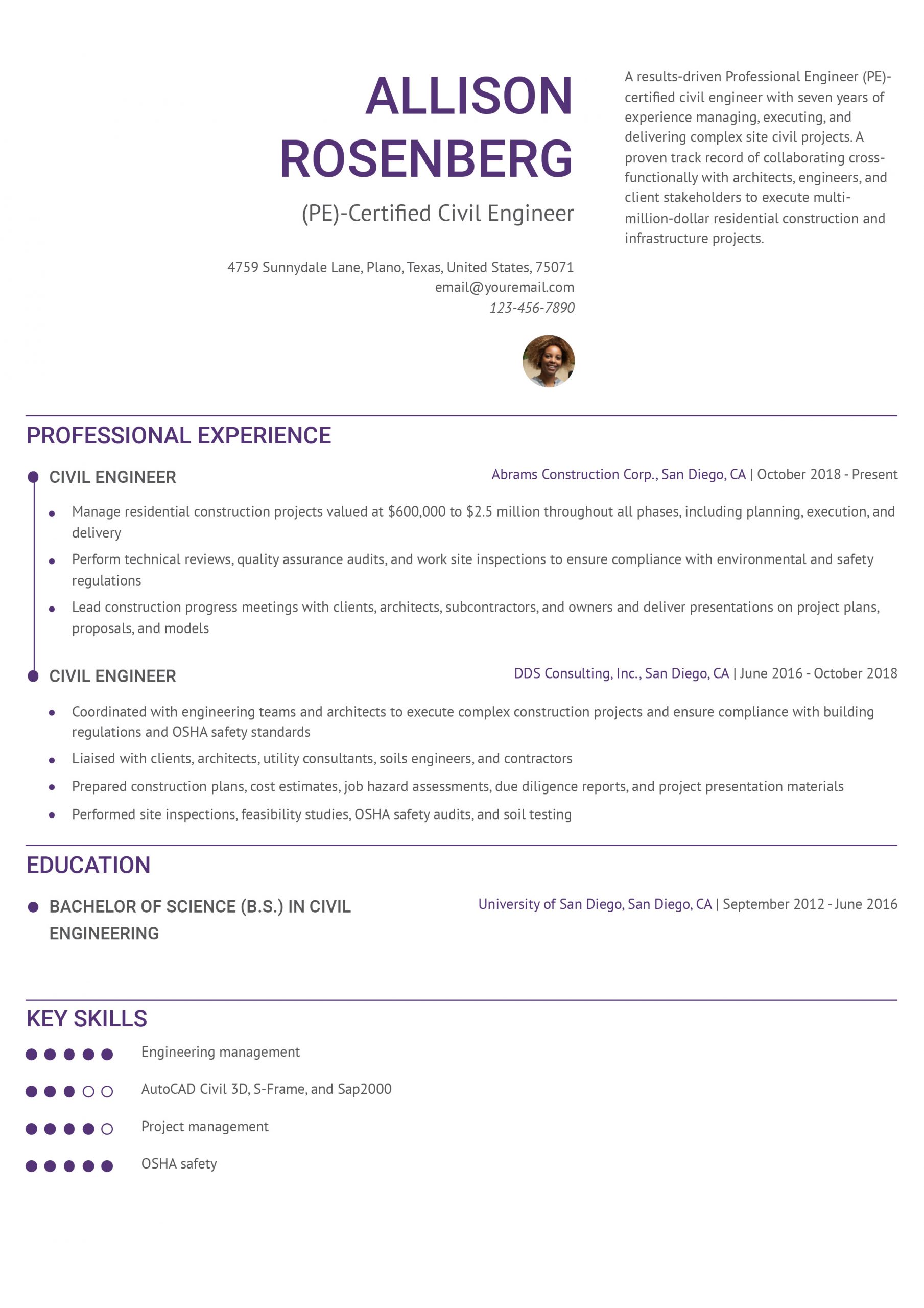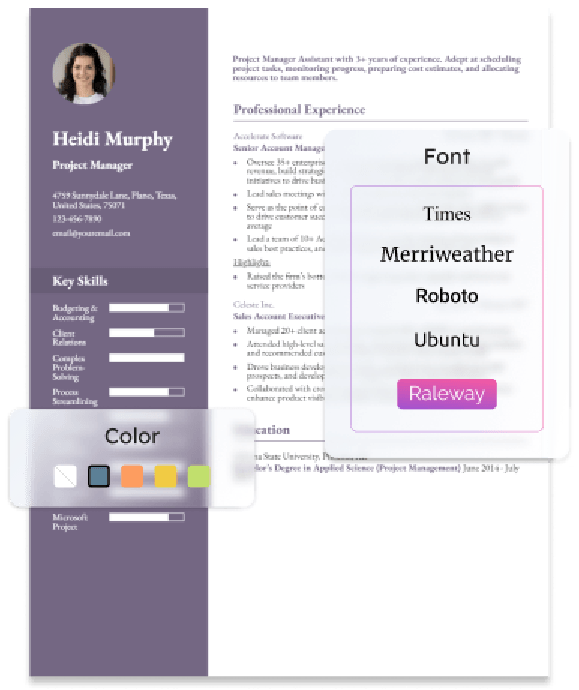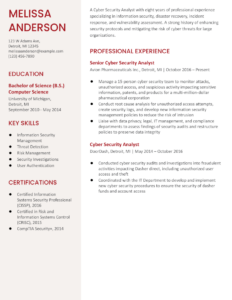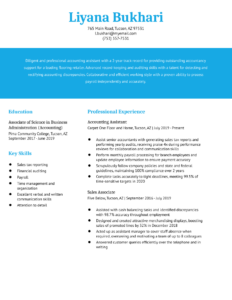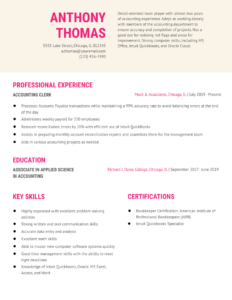How To Write a Civil Engineering Resume
As a civil engineer, you must craft a resume that shows your experience, whether it’s in managing wastewater treatment systems or building dams and roads. Also, it must align with your career goals and the specific role you’re applying for. This comprehensive guide will provide real civil engineering resume examples and valuable insights. We’ll also delve into the key elements of a standout civil engineering resume, such as featuring your technical expertise, project management skills, and a strong understanding of core principles.
Whether you’re a seasoned professional or just starting your career, this guide will equip you with the knowledge and tools to create a compelling resume. You’ll learn how to capture the attention of hiring managers and position yourself as a competitive candidate in civil engineering.
- Entry-Level
- Mid-Career
- Senior-Level
1. Write a brief summary of your civil engineering qualifications
Craft a compelling profile to set the stage for the rest of your resume, enticing hiring managers to read further. Be concise, using two to three sentences to provide a snapshot of your skills, experience, and career accomplishments. Incorporate keywords relevant to the job description and civil engineering field to ensure your profile speaks to the specific role you’re applying for.
Mention the number of years of experience you have to establish your expertise. To make your profile stand out, consider including an impressive statistic that shows a significant achievement you’ve made in previous projects. Focus on demonstrating your technical proficiency, problem-solving abilities, and commitment to delivering high-quality results within budget and schedule.
Senior-Level Profile Example:
A senior civil engineer with over 10 years of experience in planning and constructing buildings, roads, dams, and underground systems. A proven track record of leading high-performance construction teams to execute multi-million-dollar projects. Adept at identifying opportunities to mitigate safety risks and enhance project delivery.
Entry-Level Profile Example:
A Fundamentals of Engineering (FE)-certified civil engineer with two years of experience designing, implementing, and managing drinking water, storm sewer, and wastewater treatment systems. A proven track record of executing complex engineering projects on time and within budget. Committed to designing cost-effective and environmentally-conscious infrastructure solutions.
2. Outline your civil engineering experience in a compelling list
Take an accomplishment-driven approach to writing your professional experience section, concentrating on what you’ve achieved in your work rather than listing tasks and responsibilities. To make this section impactful, focus on quantifying your experience by providing specific metrics, numbers, or percentages to highlight the scale and impact of your projects.
For example, you can describe the size and complexity of projects, mention time reductions or cost savings achieved, or showcase improvements in quality or safety. Use strong action verbs in your bullet points to add a dynamic element to your resume and bring your accomplishments to life.
Senior-Level Professional Experience Example:
Senior Civil Engineer, Coulhart Construction Co., New York, NY
August 2016 – present
- Manage a dam rehabilitation project and four bridge construction projects with budgets of over $10 million, determine structural design requirements, and ensure regulatory compliance
- Perform hydrologic analyses utilizing PondPack, HEC-1, and TR-55 methodology to calculate curve numbers, time of flows, and concentrations for incremental storms
- Lead a team of over 20 civil engineers, soil engineers, and architects, serve as the point of contact for client stakeholders, and oversee more than 60 contractors
- Complete and submit permitting packages for dam and bridge reconstruction projects
Entry-Level Professional Experience Example:
Civil Engineer, CNS Construction, Philadelphia, PA
May 2022 – present
- Perform field investigation tasks for large construction and infrastructure projects, including site inspections and geophysical surveys
- Prepare technical memoranda, including due diligence reports, earthwork analysis, cost estimations, utility computations, job hazard assessments, and stormwater reports
- Conduct project planning with architects and engineers of other disciplines
- Inspect inventories and prepare orders for civil projects in alignment with budgets
3. Add civil engineering education and certifications
Your academic background demonstrates you’ve attained the fundamental knowledge and technical skills required of a civil engineer. Certain positions may also have specific educational requirements, so you must prove you hold a degree in civil engineering or another related discipline. Begin with your highest level of education and list the degree name, institution, location, and graduation date.
Additionally, showcasing certifications on your resume can give you a competitive edge. They can validate your expertise in specific software, design methodologies, and industry standards. Employers value relevant certifications as they provide assurance of your competency and commitment to professional development. Format a separate certification section, listing the certificate title, issuing organization, and completion date.
Education
Template
- [Degree Name]
- [School Name], [City, State Abbreviation] [Dates Enrolled]
Example
- Bachelor of Science in Civil Engineering, Minor in Engineering Management
- Idaho State University, Pocatello, ID, September 2008 – June 2012
Certifications
Template
- [Certification Name], [Awarding Organization], [Completion Year]
Example
- Project Management Professional (PMP), PMI, 2016
- Fundamentals of Engineering (FE) Certification, NCEES, 2013
4. Make a list of your civil engineering-related skills and proficiencies
A key skills section showcases your technical expertise, problem-solving abilities, and proficiency in using industry-specific tools and software. When listing your skills, focus on those that directly align with the requirements of the civil engineering role you’re applying for. Review the job description and identify the skills the employer is seeking. Tailor your skills section to match these requirements. Include technical and soft skills, as both demonstrate your ability to collaborate effectively and navigate complex engineering projects. Below is a list of examples to consider as you build your civil engineering resume:
| Key Skills and Proficiencies | |
|---|---|
| AutoCAD | Budget management |
| Building codes | Civil 3D |
| Construction management | Contractor management |
| Cross-functional leadership | Due diligence |
| Engineering management | Environmental impact assessment |
| Geographic information system (GIS) | Infrastructure design |
| OSHA safety | Project engineering |
| Project management | Project planning |
| Sewer CAD | StormCAD |
| Structural design | Structural engineering |
How To Pick the Best Civil Engineering Resume Template
The purpose of a resume template is to provide a professional and visually appealing structure that guides the reader’s attention to the most essential information. Selecting the right resume template is important, as it sets the foundation for effectively presenting your qualifications and experiences. The best resume template for a civil engineer is simple, organized, and highlights your most relevant professional accomplishments and key skills. Consider the template’s readability and prioritize easy navigation through the content. Customize your resume stylistically to reflect your personality, but avoid overly decorative fonts and flashy graphics.
Civil Engineering Text-Only Resume Templates and Examples
- Entry-Level
- Mid-Career
- Senior-Level
Allison Rosenberg
(123) 456-7890
[email protected]
LinkedIn | Portfolio
San Diego, CA 12345
Profile
A results-driven Professional Engineer (PE)-certified civil engineer with seven years of experience managing, executing, and delivering complex site civil projects. A proven track record of collaborating cross-functionally with architects, engineers, and client stakeholders to execute multi-million-dollar residential construction and infrastructure projects.
Key Skills
- Engineering management
- AutoCAD Civil 3D, S-Frame, and Sap2000
- Project management
- OSHA safety
- Structural engineering
Professional Experience
Civil Engineer, Abrams Construction Corp., San Diego, CA
October 2018 – present
- Manage residential construction projects valued at $600,000 to $2.5 million throughout all phases, including planning, execution, and delivery
- Perform technical reviews, quality assurance audits, and work site inspections to ensure compliance with environmental and safety regulations
- Lead construction progress meetings with clients, architects, subcontractors, and owners and deliver presentations on project plans, proposals, and models
Civil Engineer, DDS Consulting, Inc., San Diego, CA
June 2016 – October 2018
- Coordinated with engineering teams and architects to execute complex construction projects and ensure compliance with building regulations and OSHA safety standards
- Liaised with clients, architects, utility consultants, soils engineers, and contractors
- Prepared construction plans, cost estimates, job hazard assessments, due diligence reports, and project presentation materials
- Performed site inspections, feasibility studies, OSHA safety audits, and soil testing
Certifications
- PE Certification, NCEES, 2016
Education
Bachelor of Science (B.S.) Civil Engineering
University of San Diego, San Diego, CA September 2012 – June 2016
Frequently Asked Questions: Civil Engineering Resume Examples and Advice
What are common action verbs for civil engineering resumes?-
To accurately portray your work in the professional experience section of your civil engineering resume, you must use language that reflects your experience and accomplishments. Incorporating the right action verbs is essential for creating compelling bullet points and illustrating your achievements as a civil engineer. Our list of common action verbs can add a dynamic element to your resume and help you convey your accomplishments:
| Action Verbs | |
|---|---|
| Analyze | Assess |
| Build | Communicate |
| Conduct | Coordinate |
| Design | Develop |
| Draft | Engineer |
| Estimate | Evaluate |
| Identify | Interpret |
| Manage | Oversee |
| Perform | Plan |
| Prepare | Supervise |
How do you align your resume with a civil engineering job description?-
Employment for civil engineers is projected to grow at a fast-as-average rate of 7% between 2021 and 2031. More than 22,000 new jobs will be added to the workforce over the decade. Although there will be a healthy inflow of opportunities, applicants still need standout resumes to land their desired jobs.
If you have a specific civil engineer job opening in mind, it's especially beneficial to tailor your resume accordingly, increasing your chances of standing out as a strong candidate. Start by studying the job description and identifying the key skills, qualifications, and requirements the company seeks. Then, customize your resume by highlighting relevant experiences and abilities that directly align with the job opening. Focus on showcasing your expertise in areas specifically mentioned in the job description.
What is the best civil engineering resume format?-
The most suitable resume format for civil engineers is typically the reverse chronological format. This format emphasizes your most recent and relevant work experience, allowing you to feature your progression, project involvement, and specific responsibilities over time. It's particularly effective for highlighting a consistent career trajectory, relevant achievements, and technical skills acquired throughout your professional journey. A functional resume format should generally be avoided in most cases. Skill-based resumes often lack detailed bullet points, essential for telling your story and conveying your work experience.
Craft your perfect resume in minutes
Get 2x more interviews with Resume Builder. Access Pro Plan features for a limited time!

